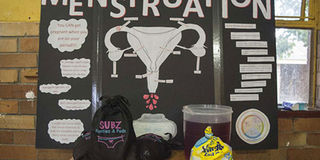Breaking News: KDF chopper crash kills five in West Pokot
Let's now make menstruation a beautiful thing

Menstruation is a normal part of a woman’s existence and it shouldn’t be a source of feelings of disgrace. PHOTO | FILE | NATION MEDIA GROUP
What you need to know:
- India has regular festivals aimed at busting myths and taboos held towards menstruation.
There is this huge bill board in the Nairobi CBD that shows a photograph of a young girl with a disability holding a menstrual cup with period blood running down her face.
I am not sure who put up this billboard or what exactly they intended to communicate, but if they intended to elicit shock, this billboard definitely does so.
If this advert was intended to make periods seem like a positive part of a woman’s existence, then it failed because this photograph perpetuates that misguided notion that periods are dirty thus shameful.
The picture of this young girl reminds me of the free bleeding community, a radical movement founded in 2013 intended to repel all feminine hygiene products because free-bleeders see them as inventions by man intended to ‘rape’ a woman during her period.
The idea of free bleeding is to encourage women to let their menstrual blood flow freely no matter where it may end up a notion I find irresponsible.
I mean, you can’t come to my home and bleed all over my couch and call it liberation.
LET'S TALK ABOUT IT
But both the free bleeders and the owners of this billboard do have a point.
Menstruation is a normal part of a woman’s existence and it shouldn’t be a source of feelings of disgrace, embarrassment and shame for her.
And I’m glad that both of these groups of people exist because rather than being just a woman’s issue which women deal with quietly and discreetly, menstruation is finally something that we are all talking about.
We still have women and girls who do not have access to sanitary pads; women and girls who despite being in excruciating pain during their periods, hide their pain and try to pretend that it doesn’t exist.
We just need to find ways that we can have this conversation while still dignifying women.
We just have to find ways to talk about periods without further stigmatising women.
CELEBRATION
My friend tells me that on the morning that she stared at her cherry stained underwear for the first time, her father took her out for a meal, had a close conversation with her on womanhood and then bought her a menstruation gift.
Her father was able to make a day that is riddled with shame, uncertainty and confusion for many young Kenyan girls a beautiful day.
This Kenyan father is definitely one of a kind, but menstruation-related celebrations are common in certain cultures.
India, which has had a long history of period shaming, with menstruating women kept away from the community for days at a time, is finally changing things.
It has regular festivals aimed at busting myths and taboos held towards menstruation.
PHASE
Communities also regularly celebrate a girl's first period as well as a woman’s menopause because they are milestones that mark a woman’s physical and emotional changes.
Maybe we could start having little celebrations, period parties, in our communities when a girl marks this milestones the same way we celebrate when boys go through initiation.
This way, the start of a period is no longer a secret; menstruation will cease to be a conversation that is had in hushed tones behind closed doors.





